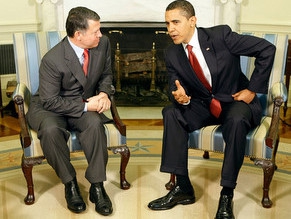|
World Jewish News

President Obama Meets With Jordan King Abdullah II At The White House. Photo by Chip Somodevilla/Getty Images North America
|
Obama promises to consult Jordan on Israeli-Palestinian peace talk issues
18.01.2012, Israel and the World The United States will consult closely with Jordan to encourage Israel and the Palestinians to negotiate in a "serious fashion" to find peace, U.S. President Barack Obama said Tuesday.
Speaking in the Oval Office alongside Jordan's King Abdullah II, Obama said he appreciated Jordan's leadership on the stalled peace effort.
After the meeting Abdullah told reporters the talks were in their early stages and that "we have to keep our fingers crossed." Abdullah told the Washington Post in an interview that, because of the elections in the United States, "we can't expect for the Americans to wade in, full-weight, unless we have enough of a package where the outcome is somewhat predictable."
Abdullah also said that "the presidential card can only be played once, and we are nowhere near the position at this stage where the presidential card can be played. It is up to us to do the heavy lifting, not the president."
With regard to progress on the first three meetings that have been held since early January in Amman, Abdullah reported there had been "baby steps."
"Waiting is the worst mistake the Israelis can make. It wasn't until the elections in Egypt that suddenly Israel awoke ... Now I think there has been a big shift in the way the Israelis look at the issue, and it is imperative for them [to] get the Israeli-Palestinian issue off the menu."
Abdullah said that sooner or later a line would be crossed where the two-state solution is no longer possible - if it has not been crossed already, "at which point the only solution is the one-state solution. And then, are we talking about apartheid or democracy? The more the Israelis play with kicking this down the line, the more they are in danger of losing what they think is the ideal future Israel," the king said.
The next meeting between the parties is scheduled for January 25. Although the Quartet has set January 26 as the deadline for the presentation of concrete proposals on issues like borders and security, sources in the U.S. State Department said that focusing on the deadline will only sabotage the atmosphere of the talks and that what is important is that the parties are talking directly to each other.
Abdullah said in the short term the Jordanians were trying to get the Palestinians and Israelis to talk about security and borders, and added, "I think once you've defined the issue of borders, then you've solved the issue of settlements, and you can go straight into security talks."
Abdullah is scheduled to meet Wednesday with Secretary of State Hillary Clinton.
Meanwhile, two issues are causing some tension in relations between Israel and the United States. Officials in Israel said they were unhappy with American leaks ahead of Foreign Minister Avigdor Lieberman's expected visit in early February that some senior U.S. administration officials did not want to be photographed with Lieberman. "That is not an insult to Lieberman, it is an insult to Israel," an Israeli official said. Washington did not respond officially to reports from Israel but noted that arrangements such as joint photos were made shortly before meetings and that the visit was still under preparation.
The second issue was with regard to who specifically had canceled the joint U.S.-Israeli military exercise that was to have been the biggest in the history of ties between the two countries. The Israelis say the Americans canceled it, while according to The Atlantic Magazine, sources in the U.S. administration said Defense Minister Ehud Barak had called Secretary of Defense Leon Panetta and asked to cancel the exercise, which worried the Americans as it could appear to the Iranians to signal preparations for an attack on Iran.
The Israeli Embassy responded that a joint decision was made to postpone the exercise to the latter part of this year. "The decision, taken jointly by the European Command (EUCOM) and by the IDF, stemmed solely from technical issues," Israeli Ambassador to the United States Michael Oren said in a statement Monday, adding, "Such postponements are routine and do not reflect political or strategic concerns."
"The United States and Israel remain committed to holding the exercise - code-named Austere Challenge 12 - the largest and most robust in their historic alliance," he said.
By Avi Issacharoff and Natasha Mozgovaya
Haaretz.com
|
|
